2013年 中文系 论文摘要-《聊斋志异》(中英文) 翻译
《聊斋志异》介绍范文

《聊斋志异》介绍范文English Answer:"Strange Tales from a Chinese Studio" (聊斋志异) is a seminal work of Chinese literature, a collection of short stories written by Pu Songling during the Qing dynasty (1644-1912). Its tales blend the real and the fantastic, often featuring supernatural beings, ghosts, and demons.Pu Songling drew inspiration from traditional Chinese folklore, mythology, and the Confucian moral code. His stories explore themes of love, loss, revenge, and the boundary between humans and the supernatural."Strange Tales from a Chinese Studio" has been praised for its vivid imagery, captivating storytelling, and insightful commentary on human nature. It has been translated into numerous languages and adapted into films, television series, and operas.The collection contains over 500 stories, divided into two parts:1. Original Tales (古异): Stories based on PuSongling's own imagination and experiences.2. Strange Encounters (续异): Stories collected from other sources and retold by Pu Songling.Some of the most famous stories in "Strange Tales from a Chinese Studio" include:"The Painted Skin" (画皮): A man falls in love with a beautiful woman who turns out to be a demon in disguise."Nie Xiaoqian" (聂小倩): A ghost falls in love with a scholar and risks her existence to be with him."The Fox Fairy" (狐妖): A fox spirit transforms into a woman and marries a human.中文回答:《聊斋志异》是中国文学史上的一部杰作,由蒲松龄在清代创作的一部短篇小说集。
美国汉学家宋贤德《聊斋志异》全英译本序言系列译文二

美国汉学家宋贤德《聊斋志异》全英译本序言系列译文二【摘要】American sinologist Song Xiande has made a significant contribution to the field of Chinese studies with his complete English translation of "Strange Stories from a Chinese Studio" by Pu Songling. In this series of translated texts, Song Xiande provides readers with a deep and comprehensive understanding of the classic Chinese literary work. Through his research background and examination of the importance of "Strange Stories from a Chinese Studio," Song Xiande sets the stage for his study. He then delves into his research methods, textual analysis, character and story examinations, as well as stylistic evaluations and academic insights. Song Xiande's translation not only introduces the English-speaking world to the rich cultural heritage of Chinese literature but also influences future research in sinology. His work opens up new possibilities for the study of Chinese literature and promises a bright future for the field.【关键词】汉学家,宋贤德,聊斋志异,全英译本,序言,研究背景,重要性,研究方法,文本解读,人物分析,故事分析,作品风格,学术研究,贡献,影响,未来展望。
美国汉学家宋贤德《聊斋志异》全英译本序言系列译文二

美国汉学家宋贤德《聊斋志异》全英译本序言系列译文二1. 引言1.1 宋贤德及其对《聊斋志异》的研究意义宋贤德是一位备受尊重的美国汉学家,他对中国文学的研究颇具建树。
他的全英译本《聊斋志异》更是成为了西方学界研究的焦点。
《聊斋志异》作为中国古典文学中的经典之作,蕴含着丰富的中国文化内涵和民间传说。
宋贤德的翻译工作为西方读者打开了一扇了解中国文学的窗口,为推广中国文学作出了卓越贡献。
宋贤德对《聊斋志异》的研究意义不仅在于将这部作品翻译成英文,更在于他对其中文化、历史背景的深入解读和解释。
通过宋贤德的研究,西方读者可以更深入地了解中国古典文学的魅力,领略其中蕴含的智慧和思想。
宋贤德对《聊斋志异》的翻译也为中国文学在国际上的传播和交流做出了积极贡献。
他的译作架起了中西文化之间的桥梁,促进了两种文化的互相了解和交流。
2. 正文2.1 美国汉学家宋贤德的学术背景美国汉学家宋贤德,生于一九○◆年,毕业于哈佛大学东亚研究系,曾在中国留学多年深造,精通中文和英文。
宋贤德对中国文学有着浓厚的兴趣,尤其热爱中国古典文学,他曾多次在学术期刊上发表关于中国文学的论文和研究成果,广受好评。
宋贤德研究的重心主要集中在中国经典文学作品的翻译和研究上,他曾对《红楼梦》、《水浒传》等著名作品进行过深入研究,被誉为西方汉学界的权威之一。
而《聊斋志异》作为中国古典文学中一部充满神秘和惊悚的作品,也吸引了宋贤德的注意。
宋贤德的学术背景扎实,对中国文学有着深厚的造诣,同时又具备优秀的翻译技巧和理解能力,这些优点使得他在研究和翻译《聊斋志异》这部作品时取得了显著成就。
宋贤德的学术背景为他的研究工作提供了坚实的基础,也赋予了他在西方汉学界的重要地位。
2.2 《聊斋志异》全英译本的历史意义宋贤德的《聊斋志异》全英译本在历史上具有重要意义。
这部作品为西方读者提供了一扇了解中国传统文学和文化的窗口。
通过这本书,西方读者可以深入了解中国民间传说、神话故事和超自然现象,从而增进对中国文化的理解和认识。
《聊斋志异》英译文、译本订误与补辑

《聊斋志异》英译文、译本订误与补辑张丽(新西兰高等教育学院,新西兰奥克兰0620)摘要:关于《聊斋志异》英译文、译本的勾稽梳理,似已完备。
然而《聊斋志异》英译文、译本状况芜杂,研究者时间精力有限,叙述或有不够准确之处,内容也难免遗珠之憾。
本文通过对已有研究成果的订误与补辑,希望能为《聊斋志异》英译文献整理略尽绵薄之力。
订误主要内容如下:荷兰汉学家高延(Jan Jakob Maria de Groot )翻译了十一篇聊斋故事而非十篇,篇目与李福清、王丽娜所列也有出入;潘子延所译“A C row W ife ”不是《马介甫》而是《竹青》,所译“Some P layers of the M agic S word ”(含两则故事)分别为《池北偶谈》中的《剑侠》与《女侠》,其中《剑侠》篇被误认为《聊斋志异》中的《王者》。
补辑内容如下:潘子延所译《大力将军》与高延翻译的《果报》《跳神》为研究者失检,而高延未曾翻译的《头滚》却被录载。
同时高延所译《聊斋志异》故事可谓开以研究为目的的《聊斋志异》英译之先河,其以研究为目的的典籍征引与翻译具有独特而明显的特征。
此外,笔者还发现了两种此前仅有存目而无详考的译本,分别是1937年白廼逸译本和1974年吕世棠译本,后者为抄袭之作。
最后,笔者认为2008年出版的马德五译本为伪译本。
因此笔者建议将“吕译本”与“马译本”排除于《聊斋志异》英译史及英译研究之外。
关键词:《聊斋志异》英译文;高延;潘子延;白廼逸;吕世棠;马德五中图分类号:I207.419文献标志码:A 收稿日期:2022-08-29作者简介:张丽(1989-),女,山东滨州人。
新西兰高等教育学院幼儿教育专业学士后在读,研究方向为明清小说英译。
·《聊斋志异》在国外·文章编号:1002⁃3712(2023)01⁃0059⁃20引言本文所作相关订误及补辑乃是按《聊斋志异》(下文简称《志异》)相关英译文及译本的出版顺序进行。
蒲松龄《聊斋志异》原文加翻译
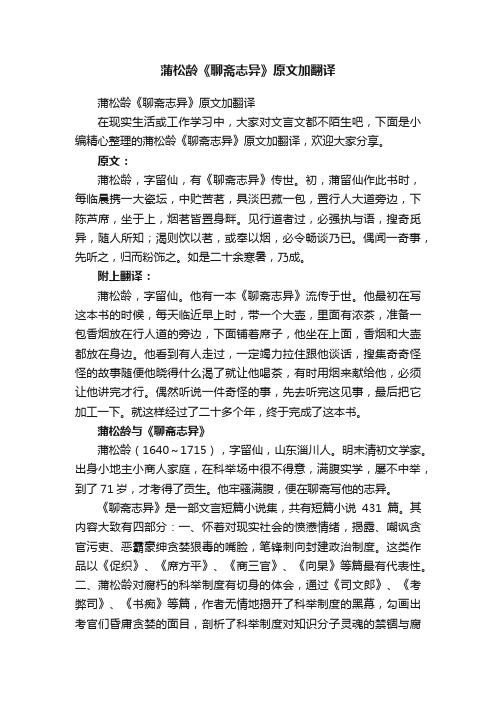
蒲松龄《聊斋志异》原文加翻译蒲松龄《聊斋志异》原文加翻译在现实生活或工作学习中,大家对文言文都不陌生吧,下面是小编精心整理的蒲松龄《聊斋志异》原文加翻译,欢迎大家分享。
原文:蒲松龄,字留仙,有《聊斋志异》传世。
初,蒲留仙作此书时,每临晨携一大瓷坛,中贮苦茗,具淡巴菰一包,置行人大道旁边,下陈芦席,坐于上,烟茗皆置身畔。
见行道者过,必强执与语,搜奇觅异,随人所知;渴则饮以茗,或奉以烟,必令畅谈乃已。
偶闻一奇事,先听之,归而粉饰之。
如是二十余寒暑,乃成。
附上翻译:蒲松龄,字留仙。
他有一本《聊斋志异》流传于世。
他最初在写这本书的时候,每天临近早上时,带一个大壶,里面有浓茶,准备一包香烟放在行人道的旁边,下面铺着席子,他坐在上面,香烟和大壶都放在身边。
他看到有人走过,一定竭力拉住跟他谈话,搜集奇奇怪怪的故事随便他晓得什么渴了就让他喝茶,有时用烟来献给他,必须让他讲完才行。
偶然听说一件奇怪的事,先去听完这见事,最后把它加工一下。
就这样经过了二十多个年,终于完成了这本书。
蒲松龄与《聊斋志异》蒲松龄(1640~1715),字留仙,山东淄川人。
明末清初文学家。
出身小地主小商人家庭,在科举场中很不得意,满腹实学,屡不中举,到了71岁,才考得了贡生。
他牢骚满腹,便在聊斋写他的志异。
《聊斋志异》是一部文言短篇小说集,共有短篇小说431篇。
其内容大致有四部分:一、怀着对现实社会的愤懑情绪,揭露、嘲讽贪官污吏、恶霸豪绅贪婪狠毒的嘴脸,笔锋刺向封建政治制度。
这类作品以《促织》、《席方平》、《商三官》、《向杲》等篇最有代表性。
二、蒲松龄对腐朽的科举制度有切身的体会,通过《司文郎》、《考弊司》、《书痴》等篇,作者无情地揭开了科举制度的黑幕,勾画出考官们昏庸贪婪的面目,剖析了科举制度对知识分子灵魂的禁锢与腐蚀,谴责了考场中营私舞弊的风气。
三、对人间坚贞、纯洁的爱情及为了这种爱情而努力抗争的底层妇女、穷书生予以衷心的赞美。
有代表性的篇章有《鸦头》、《细侯》等。
聊斋志异在线阅读 白话文+翻译

聊斋志异在线阅读白话文+翻译聊斋志异是一部中国古代小说集,作者是清代作家蒲松龄。
书中的故事多以妖怪、鬼怪、人鬼恋、妖魔鬼怪附身等为题材,描绘了神农、黄帝、秦始皇、汉武帝、唐太宗等历史人物与魔神鬼怪之间的传奇故事。
《聊斋志异》(简称《聊斋》)第一次出版是在《钟山志异》(清代水调歌头小说集)之后,也是蒲松龄所发表过的唯一一部作品。
《聊斋》共计五十八篇,写于康熙三十六年至乾隆四十四年之间。
其悬疑神秘的风格和我国优秀文学传统相结合,使之成为中国小说史上的经典之一。
《聊斋志异》中的故事情节独特,文字精妙,寓意深刻,被誉为中国古典文学的瑰宝。
这部小说集不仅开创了神怪小说的先河,也以其文学价值和思想意义在中华文化独树一帜。
参考翻译:Liaozhai Zhiyi is a collection of ancient Chinese novels written by the Qing Dynasty writer Pu Songling. The stories in the book are mostly about demons, ghosts, human-ghost love, and possession of demons and ghosts, depicting legendary stories between historical figures such as Shennong, Huangdi, Qin Shihuang, Han Wudi, Tang Taizong and demons and ghosts.Liaozhai Zhiyi, also known as Liaozhai, was published for the first time after Zhongshan Zhiyi (a collection of water-tuned song-head novels in the Qing Dynasty), and is the only work published by PuSongling. Liaozhai consists of 58 articles, written between the 36th year of Kangxi and the 44th year of Qianlong. Its suspenseful and mysterious style, combined with China's excellent literary tradition, makes it one of the classics in the history of Chinese novels.The unique plots, exquisite words, and profound meanings of the stories in Liaozhai Zhiyi are regarded as treasures of ancient Chinese literature. This collection of novels not only opened the way for divine and ghostly novels, but also stands out with its literary value and ideological significance in Chinese culture.。
《聊斋志异之司文郎》原文及译文

《聊斋志异之司文郎》原文及译文《聊斋志异之司文郎》原文及译文原文:平阳王平子,赴试北闱,赁居报国寺。
寺中有余杭生先在,王以比屋居,投刺焉,生不之答;朝夕遇之多无状。
王怒其狂悖,交往遂绝。
一日,有少年游寺中,白服裙帽,望之傀然。
近与接谈,言语谐妙,心爱敬之。
展问邦族,云:“登州宋姓。
”因命苍头设座,相对噱谈。
余杭生适过,共起逊坐。
生居然上座,更不撝挹。
卒然问宋:“亦入闱者耶?”答曰:“非也。
驽骀之才,无志腾骧久矣。
”又问:“何省?”宋告之。
生曰:“竟不进取,足知高明。
山左、右并无一字通者。
”宋曰:“北人固少通者,而不通者未必是小生;南人固多通者,然通者亦未必是足下。
”言已,鼓掌,王和之,因而哄堂。
生惭忿,轩眉攘腕而大言曰:“敢当前命题,一校文艺乎?”宋他顾而哂曰:“有何不敢!”便趋寓所,出经授王。
王随手一翻,指曰:“‘阙党童子将命。
’”生起,求笔札。
宋曳之曰:“口占可也。
我破已成:‘于宾客往来之地,而见一无所知之人焉。
’”王捧腹大笑。
生怒曰:“全不能文,徒事嫚骂,何以为人!”王力为排难,请另命佳题。
又翻曰:“‘殷有三仁焉。
’”宋立应曰:“三子者不同道,其趋一也。
夫一者何也?曰:仁也。
君子亦仁而已矣,何必同?”生遂不作,起曰:“其为人也小有才。
”遂去。
王以此益重宋。
邀入寓室,款言移晷,尽出所作质宋。
宋流览绝疾,逾刻已尽百首,曰:“君亦沉深于此道者?然命笔时,无求必得之念,而尚有冀幸得之心,即此已落下乘。
”遂取阅过者一一诠说。
王大悦,师事之;使庖人以蔗糖作水角。
宋啖而甘之,曰:“生平未解此味,烦异日更一作也。
”从此相得甚欢。
宋三五日辄一至,王必为之设水角焉。
余杭生时一遇之,虽不甚倾谈,而傲睨之气顿减。
一日以窗艺示宋,宋见诸友圈赞已浓,目一过,推置案头,不作一语。
生疑其未阅,复请之,答已览竟。
生又疑其不解,宋曰:“有何难解?但不佳耳!”生曰:“一览丹黄,何知不佳?”宋便诵其文,如夙读者,且诵且訾。
生跼蹐汗流,不言而去。
《聊斋志异》原文及翻译
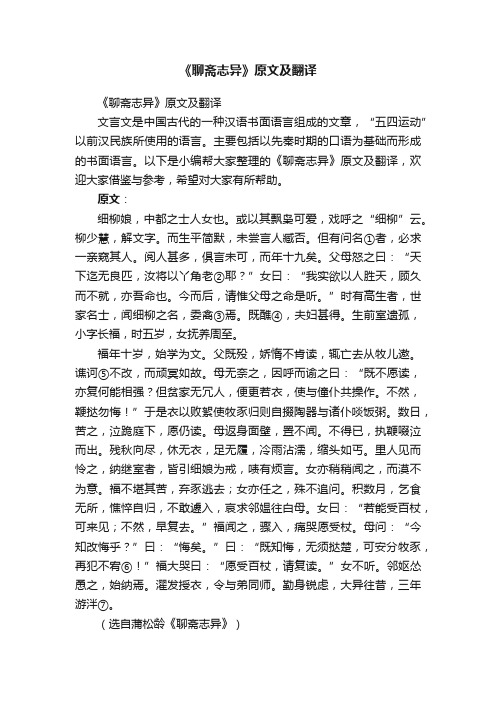
《聊斋志异》原文及翻译《聊斋志异》原文及翻译文言文是中国古代的一种汉语书面语言组成的文章,“五四运动”以前汉民族所使用的语言。
主要包括以先秦时期的口语为基础而形成的书面语言。
以下是小编帮大家整理的《聊斋志异》原文及翻译,欢迎大家借鉴与参考,希望对大家有所帮助。
原文:细柳娘,中都之士人女也。
或以其飘枭可爱,戏呼之“细柳”云。
柳少慧,解文字。
而生平简默,未尝言人臧否。
但有问名①者,必求一亲窥其人。
阅人甚多,俱言未可,而年十九矣。
父母怒之曰:“天下迄无良匹,汝将以丫角老②耶?”女曰:“我实欲以人胜天,顾久而不就,亦吾命也。
今而后,请惟父母之命是听。
”时有高生者,世家名士,闻细柳之名,委禽③焉。
既醮④,夫妇甚得。
生前室遗孤,小字长福,时五岁,女抚养周至。
福年十岁,始学为文。
父既殁,娇惰不肯读,辄亡去从牧儿遨。
谯诃⑤不改,而顽冥如故。
母无奈之,因呼而谕之曰:“既不愿读,亦复何能相强?但贫家无冗人,便更若衣,使与僮仆共操作。
不然,鞭挞勿悔!”于是衣以败絮使牧豕归则自掇陶器与诸仆啖饭粥。
数日,苦之,泣跪庭下,愿仍读。
母返身面壁,置不闻。
不得已,执鞭啜泣而出。
残秋向尽,休无衣,足无履,冷雨沾濡,缩头如丐。
里人见而怜之,纳继室者,皆引细娘为戒,啧有烦言。
女亦稍稍闻之,而漠不为意。
福不堪其苦,弃豕逃去;女亦任之,殊不追问。
积数月,乞食无所,憔悴自归,不敢遽入,哀求邻媪往白母。
女曰:“若能受百杖,可来见;不然,早复去。
”福闻之,骤入,痛哭愿受杖。
母问:“今知改悔乎?”曰:“悔矣。
”曰:“既知悔,无须挞楚,可安分牧豕,再犯不宥⑥!”福大哭曰:“愿受百杖,请复读。
”女不听。
邻妪怂恿之,始纳焉。
濯发授衣,令与弟同师。
勤身锐虑,大异往昔,三年游泮⑦。
(选自蒲松龄《聊斋志异》)【注释】①问名:古代婚姻礼仪之一,指男方去女方家提亲。
②以丫角老:终身做姑娘。
③委禽:送聘礼,表示定婚。
④醮(jiào):嫁。
⑤谯诃:责备呵斥。
美国汉学家宋贤德《聊斋志异》全英译本序言系列译文二

美国汉学家宋贤德《聊斋志异》全英译本序言系列译文二
在宋贤德《聊斋志异》全英译本序言系列的第二篇文章中,我们将继续探讨这位美国汉学家的翻译成就以及对于《聊斋志异》这一中国经典文学作品的理解和解读。
宋贤德教授出类拔萃的翻译功底和深厚的文学造诣使得他的译文不仅在语言上准确地表达了原著的意境和情感,同时也展现了他对于中国文化与历史的深刻理解与洞察。
在这篇序言中,宋贤德首先对于《聊斋志异》的独特魅力进行了诠释。
他指出,《聊斋志异》作为中国古典文学中的一颗璀璨明珠,不仅展现了中国人民对于神魔、鬼怪的丰富想象与神秘世界的描绘,更是对于社会现实的一种隐喻和讽刺。
宋贤德教授深入挖掘了《聊斋志异》背后的文化内涵与艺术价值,使得读者在阅读他的译文时不仅能够感受到作品之美,同时也能够领略到其中蕴含的深刻哲理与社会意义。
宋贤德在这篇序言中表达了对于中国古典文学的热爱与尊重。
他深情而感性地写道:“翻译《聊斋志异》是我多年来的一个梦想,我希望通过我的努力,将这部中国古典文学作品呈现给更多的西方读者,让他们能够领略到中国文化的独特魅力与深厚内涵。
”宋贤德教授对于中国文化的热爱与推崇可见一斑,他不仅仅是一位优秀的汉学家与翻译家,更是一位将中国文化介绍给世界的使者和传播者。
宋贤德《聊斋志异》全英译本序言系列译文二是一篇代表了汉学家对于中国古典文学翻译的高度成就与对于中国文化的深刻理解与尊重的文章。
通过对于《聊斋志异》的文化背景、翻译理念以及作品内涵的详细解读,宋贤德教授使得读者不仅能够更好地欣赏原著的美丽与神韵,同时也能够领略到其中所蕴含的丰富文化内涵与深刻哲理。
希望他的翻译之路能够越走越宽,为世界各地的读者带来更多优秀的中国古典文学作品的精彩译本。
《聊斋志异之小二》原文及译文
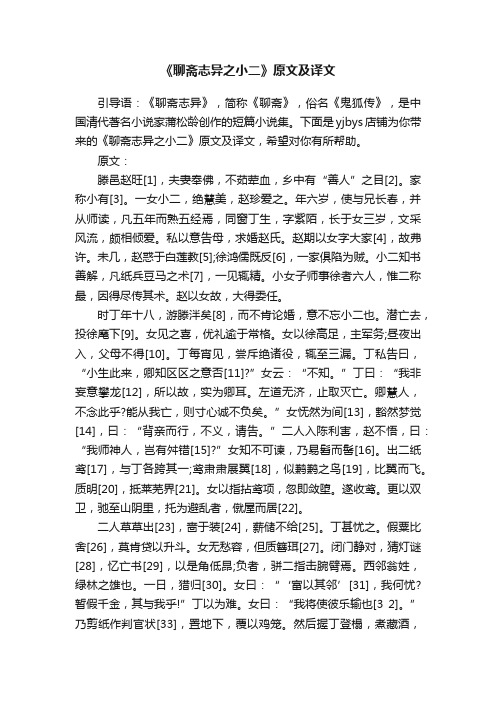
《聊斋志异之小二》原文及译文引导语:《聊斋志异》,简称《聊斋》,俗名《鬼狐传》,是中国清代著名小说家蒲松龄创作的短篇小说集。
下面是yjbys店铺为你带来的《聊斋志异之小二》原文及译文,希望对你有所帮助。
原文:滕邑赵旺[1],夫妻奉佛,不茹荤血,乡中有“善人”之目[2]。
家称小有[3]。
一女小二,绝慧美,赵珍爱之。
年六岁,使与兄长春,并从师读,凡五年而熟五经焉,同窗丁生,字紫陌,长于女三岁,文采风流,颇相倾爱。
私以意告母,求婚赵氏。
赵期以女字大家[4],故弗许。
未几,赵惑于白莲教[5];徐鸿儒既反[6],一家俱陷为贼。
小二知书善解,凡纸兵豆马之术[7],一见辄精。
小女子师事徐者六人,惟二称最,因得尽传其术。
赵以女故,大得委任。
时丁年十八,游滕泮矣[8],而不肯论婚,意不忘小二也。
潜亡去,投徐麾下[9]。
女见之喜,优礼逾于常格。
女以徐高足,主军务;昼夜出入,父母不得[10]。
丁每宵见,尝斥绝诸役,辄至三漏。
丁私告曰,“小生此来,卿知区区之意否[11]?”女云:“不知。
”丁曰:“我非妄意攀龙[12],所以故,实为卿耳。
左道无济,止取灭亡。
卿慧人,不念此乎?能从我亡,则寸心诚不负矣。
”女怃然为间[13],豁然梦觉[14],曰:“背亲而行,不义,请告。
”二人入陈利害,赵不悟,曰:“我师神人,岂有舛错[15]?”女知不可谏,乃易髫而髻[16]。
出二纸鸢[17],与丁各跨其一;鸢肃肃展翼[18],似鹣鹣之鸟[19],比翼而飞。
质明[20],抵莱芜界[21]。
女以指拈鸢项,忽即敛堕。
遂收鸢。
更以双卫,驰至山阴里,托为避乱者,僦屋而居[22]。
二人草草出[23],啬于装[24],薪储不给[25]。
丁甚忧之。
假粟比舍[26],莫肯贷以升斗。
女无愁容,但质簪珥[27]。
闭门静对,猜灯谜[28],忆亡书[29],以是角低昂;负者,骈二指击腕臂焉。
西邻翁姓,绿林之雄也。
一日,猎归[30]。
女曰:“‘富以其邻’[31],我何忧?暂假千金,其与我乎!”丁以为难。
《聊斋志异之三生》原文及译文
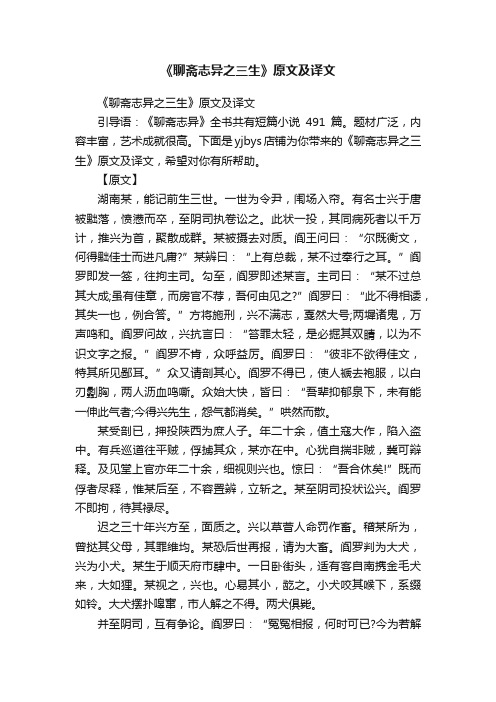
《聊斋志异之三生》原文及译文《聊斋志异之三生》原文及译文引导语:《聊斋志异》全书共有短篇小说491篇。
题材广泛,内容丰富,艺术成就很高。
下面是yjbys店铺为你带来的《聊斋志异之三生》原文及译文,希望对你有所帮助。
【原文】湖南某,能记前生三世。
一世为令尹,闱场入帘。
有名士兴于唐被黜落,愤懑而卒,至阴司执卷讼之。
此状一投,其同病死者以千万计,推兴为首,聚散成群。
某被摄去对质。
阎王问曰:“尔既衡文,何得黜佳士而进凡庸?”某辨曰:“上有总裁,某不过奉行之耳。
”阎罗即发一签,往拘主司。
勾至,阎罗即述某言。
主司曰:“某不过总其大成;虽有佳章,而房官不荐,吾何由见之?”阎罗曰:“此不得相诿,其失一也,例合答。
”方将施刑,兴不满志,戛然大号;两墀诸鬼,万声鸣和。
阎罗问故,兴抗言曰:“笞罪太轻,是必掘其双睛,以为不识文字之报。
”阎罗不肯,众呼益厉。
阎罗曰:“彼非不欲得佳文,特其所见鄙耳。
”众又请剖其心。
阎罗不得已,使人褫去袍服,以白刃劙胸,两人沥血鸣嘶。
众始大快,皆曰:“吾辈抑郁泉下,未有能一伸此气者;今得兴先生,怨气都消矣。
”哄然而散。
某受剖已,押投陕西为庶人子。
年二十余,值土寇大作,陷入盗中。
有兵巡道往平贼,俘掳其众,某亦在中。
心犹自揣非贼,冀可辩释。
及见堂上官亦年二十余,细视则兴也。
惊曰:“吾合休矣!”既而俘者尽释,惟某后至,不容置辨,立斩之。
某至阴司投状讼兴。
阎罗不即拘,待其禄尽。
迟之三十年兴方至,面质之。
兴以草菅人命罚作畜。
稽某所为,曾挞其父母,其罪维均。
某恐后世再报,请为大畜。
阎罗判为大犬,兴为小犬。
某生于顺天府市肆中。
一日卧街头,适有客自南携金毛犬来,大如狸。
某视之,兴也。
心易其小,龁之。
小犬咬其喉下,系缀如铃。
大犬摆扑嗥窜,市人解之不得。
两犬俱毙。
并至阴司,互有争论。
阎罗曰:“冤冤相报,何时可已?今为若解之。
”乃判兴来世为某婿。
某生庆云,二十八举于乡。
生一女,娴静娟好,世族争委禽焉;皆不许。
过临郡,值学使发落诸生,其第一卷李生;即兴也。
聊斋志异文化观外文文献翻译中英文参考
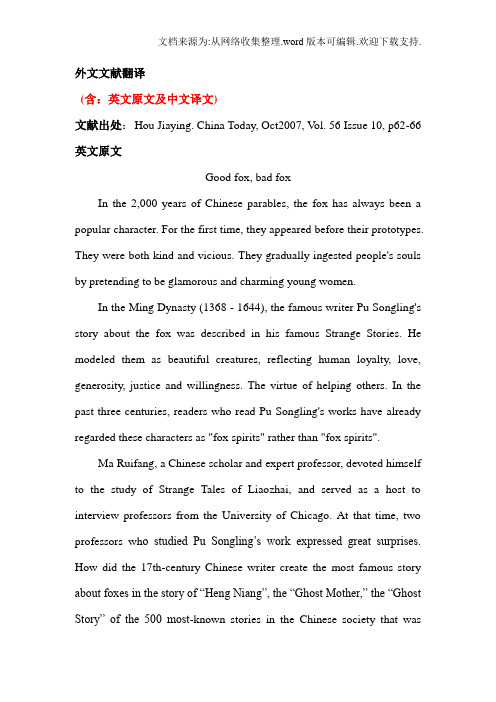
外文文献翻译(含:英文原文及中文译文)文献出处:Hou Jiaying. China Today, Oct2007, V ol. 56 Issue 10, p62-66 英文原文Good fox, bad foxIn the 2,000 years of Chinese parables, the fox has always been a popular character. For the first time, they appeared before their prototypes. They were both kind and vicious. They gradually ingested people's souls by pretending to be glamorous and charming young women.In the Ming Dynasty (1368 - 1644), the famous writer Pu Songling's story about the fox was described in his famous Strange Stories. He modeled them as beautiful creatures, reflecting human loyalty, love, generosity, justice and willingness. The virtue of helping others. In the past three centuries, readers who read Pu Songling's works have already regarded these characters as "fox spirits" rather than "fox spirits".Ma Ruifang, a Chinese scholar and expert professor, devoted himself to the study of Strange Tales of Liaozhai, and served as a host to interview professors from the University of Chicago. At that time, two professors wh o studied Pu Songling’s work expressed great surprises. How did the 17th-century Chinese writer create the most famous story about foxes in the story of “Heng Niang”, the “Ghost Mother,” the “Ghost Story” of the 500 most-known stories in the Chinese society that wasdeeply rooted in the feudal system at that time. The implicit suggestion to his wife is that they should use women's tenderness to ensure that their spouse's passion is permanent, just as lawyers rely on American newspapers and magazines in the 1980s to seek out opposite-sex friends.The ideal world for womenThe plot in “Heng Niang” is a classic love of husband, wife and mistress. Heng Niang is a kind fox and is also a human wife. She has a neighbor called Hong Daye. Hong Dayi has one wife and one wife. The wife Zhu is far more beautiful than the little one, but she is only slightly older than her grandmother. However, to the surprise of Zhu, it is her husband Hong Kong that loves her. In the same way, Heng Niang’s husband also has a small sister, who is obviously younger and more beautiful than Heng Niang, but he still loves her wife deeply. When Zhu asked Hengniang why she was like this, Hengniang told her that it was human nature to abandon old things, pursue new things, craving for something that was not available and full of mysteries. At Hengniang's suggestion, Zhu will take a lenient and generous attitude towards her husband and sister-in-law over the next month, allowing them to spend days and nights together. Heng Niang also suggested that Chu should change her appearance. In the next month, try not to dress up, wear old clothes, and keep yourself busy with housework. But on the last day of the month, she will put on new clothes, new shoes, design a beautifulhairstyle, and dress herself up. Just as Heng Niang had expected, the light of love returned to the eyes of Hong Daye. When he saw Zhu, and before dusk came, he would knock Zhu's door. However, Zhu still complied with Hengniang's suggestion, using fatigue as an excuse to gently but firmly rejected him. The next day, she followed the same strategy. On the third day, the sun had not yet landed, and the great cause slipped into her room and waited for darkness. That evening, the couple had spent the happiest night since their wedding. Afterwards, when the great cause asked her if he could spend the evening with her, Zhu expressed opposition and told him that he must wait another three days before allowing him to enter the house again.Zhu is pleased to tell Hengnian that she has regained her great business success. Heng Niang told Zhu to continue to use the female tricks she taught her because although Zhu is very beautiful, she lacks femininity, so her husband’s passion is being revived and can only be short-lived. Heng Niang explained that charm includes a woman's lifestyle, various behaviors, such as the way she walks, the way she speaks, and even her husband's eyes. Heng Niang instructs Zhu on all proper female habits and tells her to practise herself in front of the mirror every day. In this case, of course, Zhu eventually won back the husband's loyal love. The charisma mentioned by Heng Niang was defined by the famous writer and poet Luo Binwang of the Tang Dynasty (618-907) as“The Charm of Fox” 1,000 years ago. He created this word and gave it its hidden meaning in a prose about Empress Wu Zetian who convicted him. In any case, the Queen should feel honored, not provoked by this allusion.Another story about fox in “Ghost Stallion” - Jiaona. This story praises the sincere friendship and love between man and fox. When a young scholar, Kong Xueyu, became seriously ill, his friend, a fox, advised him to let his sister Jiaona cure him. A young woman whose image and way of doing things is like the grace of a willow, full of tenderness and dazzling wisdom, appearing around him. Jiao Na did a surgical operation for Conson and fed an elixir of elixir into his mouth. This medicine was depleted of her life energy and carefully cultivated. When Confucius resumed consciousness, he fell in love with the gentleness, quietness, beauty, and love of this young woman. Therefore, Confucius requested Jiao Na’s brother to marry her. However, because Jiaona was too young to marry, her family made her than her big sister Song Niang instead of her. Matsugami was as beautiful and kind as Jiaona, and the couple had lived a happy and happy life.A few years later, Kong's friend, fox cousin, told him that there was a thunderstorm that would come to their home and that they would all be destroyed unless Kong Sheng could rescue them. In spite of his own safety, Kong Xueyi immediately responded to his request. On that stormynight, Kong Shou held a sword and guarded the entrance to the cave where the fox family lived. Suddenly, a black whirlwind circled out of the hole and Jiaona was in the center of the hurricane. Confucius used his sword to make every effort to insert the black wind. In the end, Jiaona fell to the ground and was saved. As Kong’s help to her, Kong Sheng was attacked by lightning. Afterwards, the storm slowed down and the skies returned clear. The fox family was safe, but Conson was in danger. Jiao Na sacrificed the last elixir of life that had been made with a thousand years of practice and spit it in his long-lived mouth and once again saved him. With Persian's insistence, the fox family moved to live with him. In order to avoid more disasters, the fox family lived in seclusion in a quiet courtyard. The gate of the courtyard was only open to Kong Sheng and Song Niang. Several years later, Kong Sheng and Son g Niang’s children grew up, and he became a grey-haired old man. He maintained close friendship with the fox cousin and the married Jiaona and their family.Xiao Cui is another lovely fox story. Xiaocui is a very cute and lively fox, but her appearance is a pretty young lady. One day, her mother took her to the house of a surnamed family to steal. She seemed to want to abandon her daughter. The Wang family is a local family with a face, only one child, and it is a mentally retarded person. He was neither a playmate nor a man willing to marry him, but Xiao Tsui made a good friend with him and married him. Although Wang Jia first liked Xiao Cui,her unruly manner aroused their resentment. They often scolded and reprimanded her, but Xiao Cui quietly accepted this treatment. When Wang Wang was framed by his political opponents, Xiao Cui used her wisdom to save the whole family in dire straits. Moreover, she also cured her husband's mental illness. However, Xiaocui knew that her parents-in-law could never accept her rebellious attitude toward the feudal system at that time. She inadvertently discovered that a young woman looked like her and secretly arranged for her to replace him at the king’s house. Before secretly leaving, Xiao Cui admitted to her husband that she was actually a fox daughter. Several decades ago, her mother escaped the thunder robbery under Wang's robe. At that time, Wang was sheltering in a temple. Although Master Wang did not realize that he had given the fox mother help, she felt grateful for the reward she had at that time. It is for this reason that she left Xiaocui in her care.Evil foxRumors are often used to describe foxes. However, such clever and beautiful creatures are often described in ambiguity and humility. There is such an example in the rumors of "tiger tigers." This is an allegory of swindlers and rogues. It means that they will bend others to boast of their powerful power. Its origin was a story about the king of the Chu state two thousand years ago. The king asked his minister: "There are rumors that the northern princes are afraid of the Chu Ling Yin Zhao shirt. Is thatreally it?" His minister answered the king's question through a parable: The king of the forest tigers eat a When it just captured the fox, the fox told it: "You can't eat me because I have God's instructions and let me be the leader of the beast. If you don't believe me, then go with me through the forest and see if There are other animals that dare to block my path." The tiger agreed. Sure enough, all the animals fled far when they were close. The tiger does not understand that animals are afraid of it, not foxes, that they dare not eat foxes.Minister Jiang Yi continued to point out that the king’s territories cover an area of 2,500 square kilometers, and the military power has reached a million people. All of them are under the command of the Shojo shirt. The northern princes are undoubtedly afraid of the zhao yi shirts, but his position is as the king’s military power's controller and supreme imperial power. Jiang Yi warned that if the king is forced, his advantage will be weakened. Then the king gradually diluted Zhao's military power.The scolded foxShe is the leading actress in the "God List" and is a typical example of the evil fox. This Ming Dynasty literary work is about the story of the demise of the Shang Dynasty and the rise of the Zhou Dynasty. Yu Wang is the last monarch of Shang Dynasty and also a notorious tyrant. In the common people, he levies exorbitant taxes and exorbitant taxes to build aluxury palace for himself and live a life of levity. During his reign, the 600-year-old Shang Dynasty quickly disintegrated. The warfare of the embarrassment caused the people to lose their livelihoods and make the rule of the monarchy chaotic. In the "God List", the scorpion's nephew has been described as the culprit of the demise of the Shang Dynasty.She was a fox and she became beautiful. The image of the woman was sent to the palace to envy the king and overthrow the Shang Dynasty. Her reward is immortal.The king of Yu is very careless about the national affairs. He has given everything to his uncle. Bichon discovered his true face and urged the king to get rid of her, but it was useless. Not only that, but the king also was very angry with his uncle's reckless behavior and ordered the expulsion of Began. Having realized that the threat to her was greater than that of Gan Qi, he formulated a plan to kill the enemy. She pretended to be sick, and she deluded another king with a beauty, telling him that unless she had a heart to eat, she would die. Bichon was thus killed, but the evil of self-absorbedness surpassed that of her enemies. She was addicted to the love of unborn babies, and even encouraged the king to indulge in the gorgeous life of wine. All these have accelerated the demise of the Shang dynasty.She was eventually arrested and sentenced to death, but all executioners who were sent to execute the order were smitten by hercharms and could not execute the order. After a few skilled butchers failed to perform their duties, a magical general ended his own life with his own hands.One of the main reasons for this novel is to explain why women's charisma is often equated with the evil fox, and why calling a woman fox is often regarded as an insult.Although there are all kinds of negative foxes, fox skin has always been widely praised. The earliest written reference was in the Book of Songs 2000 years ago. It wrote: "Use fur coats to make fur coats for our young princes." Fox coats are considered the only suit for nobles.The ancient Chinese tried every means to capture the fox's skin as much as possible, but since the fox was a very vigilant and very devious animal, hunting was usually just successful in making it vigilant. Humans have never successfully domesticated or reared foxes. It is one of the few animals that have enough intelligence to deceive humans.It may be a mixture of resentment and admiration, which has caused the Chinese literary world to describe it as an alternation of good and evil. The mythical encyclopedia of Mountain and Sea Classics and Geography Editing over 2000 describes the fox as a monster that has nine tails and special eaters. Shuo Wen Jie Zi (The principle of interpretation and study of characters), the first dictionary in Chinese history, created during the Eastern Han Dynasty from 100 to 121 years ago, defines the fox as "afascinating animal being devil-ridden."中文译文好狐狸,坏狐狸在中国两千多年的寓言中, 狐狸一直是受欢迎的角色。
聊斋志异故事的原文和译文
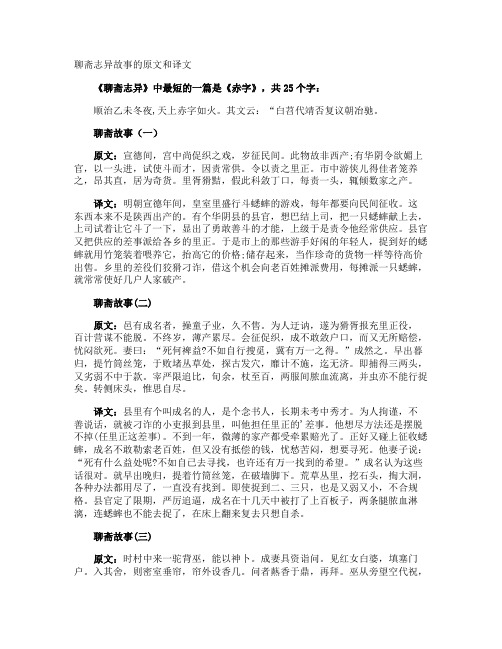
聊斋志异故事的原文和译文《聊斋志异》中最短的一篇是《赤字》,共25个字:顺治乙未冬夜,天上赤字如火。
其文云:“白苕代靖否复议朝冶驰。
聊斋故事(一)原文:宣德间,宫中尚促织之戏,岁征民间。
此物故非西产;有华阴令欲媚上官,以一头进,试使斗而才,因责常供。
令以责之里正。
市中游侠儿得佳者笼养之,昂其直,居为奇货。
里胥猾黠,假此科敛丁口,每责一头,辄倾数家之产。
译文:明朝宣德年间,皇室里盛行斗蟋蟀的游戏,每年都要向民间征收。
这东西本来不是陕西出产的。
有个华阴县的县官,想巴结上司,把一只蟋蟀献上去,上司试着让它斗了一下,显出了勇敢善斗的才能,上级于是责令他经常供应。
县官又把供应的差事派给各乡的里正。
于是市上的那些游手好闲的年轻人,捉到好的蟋蟀就用竹笼装着喂养它,抬高它的价格;储存起来,当作珍奇的货物一样等待高价出售。
乡里的差役们狡猾刁诈,借这个机会向老百姓摊派费用,每摊派一只蟋蟀,就常常使好几户人家破产。
聊斋故事(二)原文:邑有成名者,操童子业,久不售。
为人迂讷,遂为猾胥报充里正役,百计营谋不能脱。
不终岁,薄产累尽。
会征促织,成不敢敛户口,而又无所赔偿,忧闷欲死。
妻曰:“死何裨益?不如自行搜觅,冀有万一之得。
”成然之。
早出暮归,提竹筒丝笼,于败堵丛草处,探古发穴,靡计不施,迄无济。
即捕得三两头,又劣弱不中于款。
宰严限追比,旬余,杖至百,两服间脓血流离,并虫亦不能行捉矣。
转侧床头,惟思自尽。
译文:县里有个叫成名的人,是个念书人,长期未考中秀才。
为人拘谨,不善说话,就被刁诈的小吏报到县里,叫他担任里正的'差事。
他想尽方法还是摆脱不掉(任里正这差事)。
不到一年,微薄的家产都受牵累赔光了。
正好又碰上征收蟋蟀,成名不敢勒索老百姓,但又没有抵偿的钱,忧愁苦闷,想要寻死。
他妻子说:“死有什么益处呢?不如自已去寻找,也许还有万一找到的希望。
”成名认为这些话很对。
就早出晚归,提着竹筒丝笼,在破墙脚下。
荒草丛里,挖石头,掏大洞,各种办法都用尽了,一直没有找到。
《聊斋志异之王六郎》原文及译文

《聊斋志异之王六郎》原文及译文引导语:《聊斋志异》,简称《聊斋》,俗名《鬼狐传》,是中国清代著名小说家蒲松龄创作的短篇小说集。
下面是yjbys店铺为你带来的《聊斋志异之王六郎》原文及译文,希望对你有所帮助。
原文许姓,家淄之北郭[1],业渔。
每夜,携酒何上,饮且渔。
饮则酹地[2],祝云[3]:“河中溺鬼得饮。
”以为常。
他人渔,迄无所获,而许独满筐。
一夕,方独酌,有少年来,徘徊其侧。
让之饮,慨与同酌。
既而终夜不获一鱼,意颇失。
少年起曰:“请于下流为君驱之[4]。
”遂飘然去。
少间,复返,曰:“鱼大至矣。
”果闻唼呷有声[5]。
举网而得数头,皆盈尺。
喜极,申谢[6]。
欲归,赠以鱼,不受,曰:“屡叨佳酝[7],区区何足云报。
如不弃,要当以为长耳[8]。
”许曰:“方共一夕,何言屡也?如肯永顾,诚所甚愿;但愧无以为情。
”询其姓字,曰:“姓王,无字[9],相见可呼王六郎。
”遂别。
明日,许货鱼,益沽酒[10]。
晚至河干[11],少年已先在,遂与欢饮。
饮数杯,辄为许驱鱼。
如是半载。
忽告许曰:“拜识清扬[12],情逾骨肉。
然相别有日矣。
”语甚凄楚。
惊问之。
欲言而止者再,乃曰:“情好如吾两人,言之或勿讶耶?今将别,无妨明告:我实鬼也。
素嗜酒,沉醉溺死,数年于此矣。
前君之获鱼,独胜于他人者,皆仆之暗驱,以报酹奠耳。
明日业满[13],当有代者,将往投生。
相聚只今夕,故不能无感。
”许初闻甚骇;然亲狎既久,不复恐怖。
因亦欷歔,酌而言曰:“六郎饮此,勿戚也。
相见遽违,良足悲侧,然业满劫脱[14],正宜相贺,悲乃不伦[15]。
”遂与畅饮。
因问:“代者何人?”曰:“兄于河畔视之,亭午[16],有女子渡河而溺者,是也。
”听村鸡既唱,洒涕而别。
明日,敬伺河边,以觇其异。
果有妇人抱婴儿来,及河而堕。
儿抛岸上[17],扬手掷足而啼。
妇沉浮者屡矣,忽淋淋攀岸以出,藉地少息,抱儿径去。
当妇溺时,意良不忍,思欲奔救,转念是所以代六郎者,故止不救。
及妇自出,疑其言不验。
《聊斋志异之黄英》原文及译文

《聊斋志异之黄英》原文及译文《聊斋志异之黄英》原文及译文《聊斋志异》,简称《聊斋》,俗名《鬼狐传》,是中国清代著名小说家蒲松龄创作的短篇小说集。
下面是店铺为你带来的《聊斋志异之黄英》原文及译文,希望对大家有所帮助。
【原文】马子才,顺天人。
世好菊,至才尤甚,闻有佳种必购之,千里不惮。
一日有金陵客寓其家,自言其中表亲有一二种,为北方所无。
马欣动,即刻治装,从客至金陵。
客多方为之营求,得两芽,裹藏如宝。
归至中途,遇一少年,跨蹇从油碧车,丰姿洒落。
渐近与语,少年自言:“陶姓。
”谈言骚雅。
因问马所自来,实告之。
少年曰:“种无不佳,培溉在人。
”因与论艺菊之法。
马大悦,问:“将何往?”答云:“姊厌金陵,欲卜居于河朔耳。
”马欣然曰:“仆虽固贫,茅庐可以寄榻。
不嫌荒陋,无烦他适。
”陶趋车前向姊咨禀,车中人推帘语,乃二十许绝世美人也。
顾弟言:“屋不厌卑,而院宜得广。
”马代诺之,遂与俱归。
第南有荒圃,仅小室三四椽,陶喜居之。
日过北院为马治菊,菊已枯,拔根再植之,无不活。
然家清贫,陶日与马共饮食,而察其家似不举火。
马妻吕,亦爱陶姊,不时以升斗馈恤之。
陶姊小字黄英,雅善谈,辄过吕所,与共纫绩。
陶一日谓马曰:“君家固不丰,仆日以口腹累知交,胡可为常!为今计,卖菊亦足谋生。
”马素介,闻陶言,甚鄙之,曰:“仆以君风流雅士,当能安贫;今作是论,则以东篱为市井,有辱黄花矣。
”陶笑曰:“自食其力不为贪,贩花为业不为俗。
人固不可苟求富,然亦不必务求贫也。
”马不语,陶起而出。
自是马所弃残枝劣种,陶悉掇拾而去。
由此不复就马寝食,招之始一至。
未几菊将开,闻其门嚣喧如市。
怪之,过而窥焉,见市人买花者,车载肩负,道相属也。
其花皆异种,目所未睹。
心厌其贪,欲与绝;而又恨其私秘佳种,遂款其扉,将就消让。
陶出,握手曳入。
见荒庭半亩皆菊畦,数椽之外无旷土。
劚去者,则折别枝插补之;其蓓蕾在畦者,罔不佳妙,而细认之,尽皆向所拔弃也。
陶入室,出酒馔,设席畦侧,曰:“仆贫不能守清戒,连朝幸得微资,颇足供醉。
聊斋志异原文及其翻译
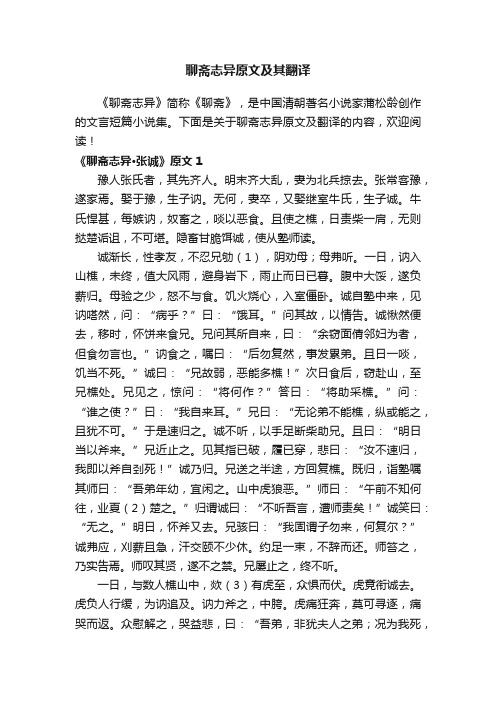
聊斋志异原文及其翻译《聊斋志异》简称《聊斋》,是中国清朝著名小说家蒲松龄创作的文言短篇小说集。
下面是关于聊斋志异原文及翻译的内容,欢迎阅读!《聊斋志异·张诚》原文1豫人张氏者,其先齐人。
明末齐大乱,妻为北兵掠去。
张常客豫,遂家焉。
娶于豫,生子讷。
无何,妻卒,又娶继室牛氏,生子诚。
牛氏悍甚,每嫉讷,奴畜之,啖以恶食。
且使之樵,日责柴一肩,无则挞楚诟诅,不可堪。
隐畜甘脆饵诚,使从塾师读。
诚渐长,性孝友,不忍兄劬(1),阴劝母;母弗听。
一日,讷入山樵,未终,值大风雨,避身岩下,雨止而日已暮。
腹中大馁,遂负薪归。
母验之少,怒不与食。
饥火烧心,入室僵卧。
诚自塾中来,见讷嗒然,问:“病乎?”曰:“饿耳。
”问其故,以情告。
诚愀然便去,移时,怀饼来食兄。
兄问其所自来,曰:“余窃面倩邻妇为者,但食勿言也。
”讷食之,嘱曰:“后勿复然,事发累弟。
且日一啖,饥当不死。
”诚曰:“兄故弱,恶能多樵!”次日食后,窃赴山,至兄樵处。
兄见之,惊问:“将何作?”答曰:“将助采樵。
”问:“谁之使?”曰:“我自来耳。
”兄曰:“无论弟不能樵,纵或能之,且犹不可。
”于是速归之。
诚不听,以手足断柴助兄。
且曰:“明日当以斧来。
”兄近止之。
见其指已破,履已穿,悲曰:“汝不速归,我即以斧自刭死!”诚乃归。
兄送之半途,方回复樵。
既归,诣塾嘱其师曰:“吾弟年幼,宜闲之。
山中虎狼恶。
”师曰:“午前不知何往,业夏(2)楚之。
”归谓诚曰:“不听吾言,遭师责矣!”诚笑曰:“无之。
”明日,怀斧又去。
兄骇曰:“我固谓子勿来,何复尔?”诚弗应,刈薪且急,汗交颐不少休。
约足一束,不辞而还。
师笞之,乃实告焉。
师叹其贤,遂不之禁。
兄屡止之,终不听。
一日,与数人樵山中,欻(3)有虎至,众惧而伏。
虎竟衔诚去。
虎负人行缓,为讷追及。
讷力斧之,中胯。
虎痛狂奔,莫可寻逐,痛哭而返。
众慰解之,哭益悲,曰:“吾弟,非犹夫人之弟;况为我死,我何生焉!”遂以斧自刎其项。
众急救之,入肉者已寸许,血溢如涌,眩瞀殒绝。
《聊斋志异之董生》原文及译文
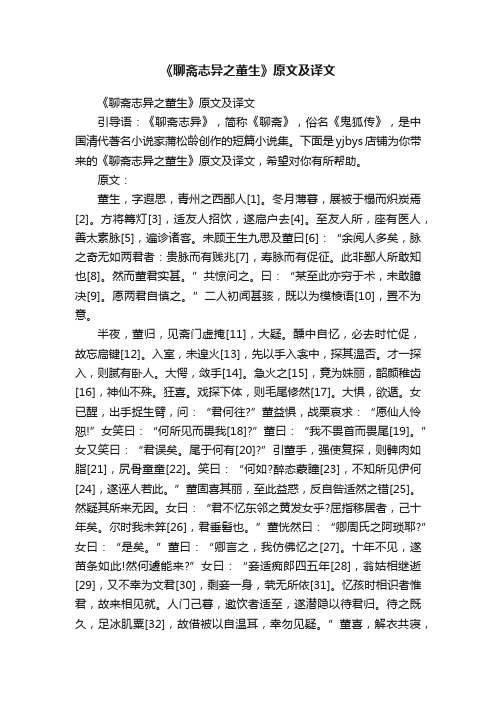
《聊斋志异之董生》原文及译文《聊斋志异之董生》原文及译文引导语:《聊斋志异》,简称《聊斋》,俗名《鬼狐传》,是中国清代著名小说家蒲松龄创作的短篇小说集。
下面是yjbys店铺为你带来的《聊斋志异之董生》原文及译文,希望对你有所帮助。
原文:董生,字遐思,青州之西鄙人[1]。
冬月薄暮,展被于榻而炽炭焉[2]。
方将篝灯[3],适友人招饮,遂扃户去[4]。
至友人所,座有医人,善太素脉[5],遍诊诸客。
未顾王生九思及董曰[6]:“余阅人多矣,脉之奇无如两君者:贵脉而有贱兆[7],寿脉而有促征。
此非鄙人所敢知也[8]。
然而董君实甚。
”共惊问之。
曰:“某至此亦穷于术,未敢臆决[9]。
愿两君自慎之。
”二人初闻甚骇,既以为模棱语[10],置不为意。
半夜,董归,见斋门虚掩[11],大疑。
醺中自忆,必去时忙促,故忘扃键[12]。
入室,未遑火[13],先以手入衾中,探其温否。
才一探入,则腻有卧人。
大愕,敛手[14]。
急火之[15],竟为姝丽,韶颜稚齿[16],神仙不殊。
狂喜。
戏探下体,则毛尾修然[17]。
大惧,欲遁。
女已醒,出手捉生臂,问:“君何往?”董益惧,战栗哀求:“愿仙人怜恕!”女笑曰:“何所见而畏我[18]?”董曰:“我不畏首而畏尾[19]。
”女又笑曰:“君误矣。
尾于何有[20]?”引董手,强使复探,则髀肉如脂[21],尻骨童童[22]。
笑曰:“何如?醉态蒙瞳[23],不知所见伊何[24],遂诬人若此。
”董固喜其丽,至此益惑,反自咎适然之错[25]。
然疑其所来无因。
女曰:“君不忆东邻之黄发女乎?屈指移居者,己十年矣。
尔时我未笄[26],君垂髫也。
”董恍然曰:“卿周氏之阿琐耶?”女曰:“是矣。
”董曰:“卿言之,我仿佛忆之[27]。
十年不见,遂苗条如此!然何遽能来?”女曰:“妾适痴郎四五年[28],翁姑相继逝[29],又不幸为文君[30],剩妾一身,茕无所依[31]。
忆孩时相识者惟君,故来相见就。
人门己暮,邀饮者适至,遂潜隐以待君归。
《聊斋志异之于去恶》原文及译文
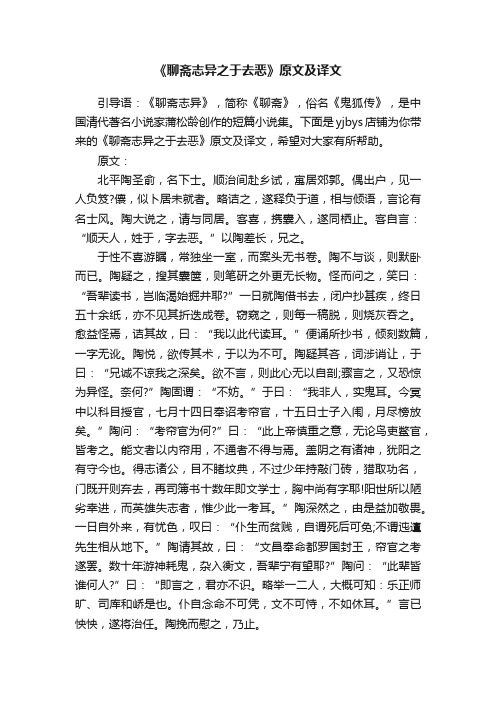
《聊斋志异之于去恶》原文及译文引导语:《聊斋志异》,简称《聊斋》,俗名《鬼狐传》,是中国清代著名小说家蒲松龄创作的短篇小说集。
下面是yjbys店铺为你带来的《聊斋志异之于去恶》原文及译文,希望对大家有所帮助。
原文:北平陶圣俞,名下士。
顺治间赴乡试,寓居郊郭。
偶出户,见一人负笈?儴,似卜居未就者。
略诘之,遂释负于道,相与倾语,言论有名士风。
陶大说之,请与同居。
客喜,携囊入,遂同栖止。
客自言:“顺天人,姓于,字去恶。
”以陶差长,兄之。
于性不喜游瞩,常独坐一室,而案头无书卷。
陶不与谈,则默卧而已。
陶疑之,搜其囊箧,则笔研之外更无长物。
怪而问之,笑曰:“吾辈读书,岂临渴始掘井耶?”一日就陶借书去,闭户抄甚疾,终日五十余纸,亦不见其折迭成卷。
窃窥之,则每一稿脱,则烧灰吞之。
愈益怪焉,诘其故,曰:“我以此代读耳。
”便诵所抄书,倾刻数篇,一字无讹。
陶悦,欲传其术,于以为不可。
陶疑其吝,词涉诮让,于曰:“兄诚不谅我之深矣。
欲不言,则此心无以自剖;骤言之,又恐惊为异怪。
奈何?”陶固谓:“不妨。
”于曰:“我非人,实鬼耳。
今冥中以科目授官,七月十四日奉诏考帘官,十五日士子入闱,月尽榜放矣。
”陶问:“考帘官为何?”曰:“此上帝慎重之意,无论鸟吏鳖官,皆考之。
能文者以内帘用,不通者不得与焉。
盖阴之有诸神,犹阳之有守今也。
得志诸公,目不睹坟典,不过少年持敲门砖,猎取功名,门既开则弃去,再司簿书十数年即文学士,胸中尚有字耶!阳世所以陋劣幸进,而英雄失志者,惟少此一考耳。
”陶深然之,由是益加敬畏。
一日自外来,有忧色,叹曰:“仆生而贫贱,自谓死后可免;不谓迍邅先生相从地下。
”陶请其故,曰:“文昌奉命都罗国封王,帘官之考遂罢。
数十年游神耗鬼,杂入衡文,吾辈宁有望耶?”陶问:“此辈皆谁何人?”曰:“即言之,君亦不识。
略举一二人,大概可知:乐正师旷、司库和峤是也。
仆自念命不可凭,文不可恃,不如休耳。
”言已怏怏,遂将治任。
陶挽而慰之,乃止。
《聊斋志异》《卷一》重点七篇篇目译文

一、王六郎梗概:讲述的是一个捕鱼人因为每晚都向水中敬酒,感动了一个水鬼,也就是本书的主人公,王六郎。
他以驱赶鱼来报答他,两人就这样形成了一种看不见的默契。
王六郎和捕鱼人见面之后,两人的友谊更是有了物质的基础,也就是更加牢固了。
启示:(1)知恩图报,有情有义。
(2)舍己救人、善良高尚。
现实意义:人和人之间,也应该注重诚信。
有个姓许的,家住淄川县城北,以打鱼为生。
他每天傍晚总要带酒到河边去,边喝酒边打鱼。
而喝酒前,又总是先斟上一盅祭奠一下,并祷告说:“河中的溺鬼,请来喝酒吧!”这样便习以为常。
其他人往往打鱼很少,而他每天都打满筐的鱼。
一天傍晚,许某刚刚独自饮酒,见一少年走来,在他身边转来转去。
许某让他同饮,少年也不推辞,二人便对饮起来。
这一夜竟连一条鱼也未能打到,许某很有些丧气。
少年起立躬身说:“我到下游为你赶鱼。
”说罢,朝下游飘然走去。
一会儿,少年回来说:“大群鱼来了!”果然听到有许多鱼吞吃饵食的声音。
许某便撒网,一网捕了十数尾尺把长的大鱼。
他非常高兴,对少年深表感谢。
少年欲走,许送鱼给他,少年不要,并说:“屡次喝你的好酒,这点小事怎能提到感谢呢?如您不嫌麻烦,我将常来找您。
”许某说:“才相见一晚,怎说多次?你如愿来相助,我是求之不得,可我怎样报答你的情意呢?”于是便问少年姓名。
少年说:“我姓王,没有名字,你见面就叫我王六郎吧。
”说罢,便告辞而去。
次日,许某将鱼卖掉,顺便多买了些酒。
当晚,许某来到河边时,六郎早已先在等候,二人便开怀畅饮。
饮几杯后,六郎便为许某赶鱼。
就这样半年过去了。
一天,六郎忽然对许说:“你我相识,情同手足,可是,咱们马上就要分别了。
”说得很是悲伤。
许某甚为诧异,问六郎为何这样,六郎考虑再三,才说:“你我既然亲如兄弟,我说了你也不必惊讶。
如今将要分别,无妨如实告知:我实际是一鬼,只因生前饮酒过量,醉后溺水而死,已经好几年了。
以前你之所以捕到比别人更多的鱼,都是我暗中帮你驱赶,以此来酬谢奠酒之情。
《聊斋志异》精选故事及译文

创作编号:BG7531400019813488897SX创作者:别如克*聊斋志异猪婆龙猪婆龙,产于西江。
形似龙而短,能横飞;常出沿江岸扑食鹅鸭。
或猎得之,则货其肉于陈、柯。
此二姓皆友谅之裔,世食婆龙肉,他族不敢食也。
一客自江右来,得一头,势舟中。
一日,泊舟钱塘,缚稍懈,忽跃入江。
俄顷,波涛大作,估舟倾沉。
(扬子鳄)译文:猪婆龙产于江西,形状像龙,但比龙身子短,能横着飞,常飞出水面沿江岸捕捉鹅鸭吃。
有时有人捉住一头,就把它杀掉,把肉卖给陈、柯两家。
这两姓人家都是陈友谅的后裔,从祖辈传下来就吃猪婆龙肉,别姓人家不敢吃。
一天,一个客人从江的西边来,捉到一头猪婆龙,把它绑在船上。
这艘船停在钱塘江边,因为没把猪婆龙绑结实,被它跑掉,一头扎进江里。
一转眼的工夫,江里波浪涛天,船立刻翻了。
快刀(古文)明末济属多盗,邑各置兵,捕得辄杀之。
章丘盗尤多。
有一兵佩刀甚利,杀辄导窾(ku ǎn。
从穴,款声。
本义:空隙;洞穴)。
一日捕盗十余名,押赴市曹。
内一盗识兵,逡巡(退让,退却的意思)告曰:“闻君刀最快,斩首无二割。
求杀我!”兵曰:“诺。
其谨依我,无离也。
”盗从之刑处,出刀挥之,豁然头落。
数步之外犹圆转,而大赞曰:“好快刀!译文:明代末年,济南府属下各地有很多强盗,每个县都设置军队,捕到强盗就杀掉。
章丘县的强盗尤其多。
这个县的官军中有一个士兵,佩带的刀特别锋利,杀人不用费劲。
一天,官军捕获了十几个强盗,全部押赴法场斩首。
其中一个强盗认得这个士兵,便犹豫地凑上前去说:“听说您的刀最快,砍头不用砍第二次。
求您杀我吧!”士兵说:“好吧。
你跟在我身边,不要离开我。
”强盗跟着士兵来到刑场,士兵一刀砍去,强盗的脑袋骨碌一声掉下来,滚到数步之外,一边在地上打着转,嘴里还大声称赞道:“好快的刀!”狐联焦生,章丘石虹先生之叔弟也。
读书园中。
宵分,有二美人来,颜色双绝。
一可十七八,一约十四五,抚几展笑。
焦知其狐,正色拒之。
长者曰:“君髯如戟[,何无丈夫气?”焦曰:“仆生平不敢二色。
- 1、下载文档前请自行甄别文档内容的完整性,平台不提供额外的编辑、内容补充、找答案等附加服务。
- 2、"仅部分预览"的文档,不可在线预览部分如存在完整性等问题,可反馈申请退款(可完整预览的文档不适用该条件!)。
- 3、如文档侵犯您的权益,请联系客服反馈,我们会尽快为您处理(人工客服工作时间:9:00-18:30)。
2013年09级韩山师范学院中文系论文摘要-《聊斋志异》(中英文)
《聊斋志异》写了很多“二女共侍一夫”的现象,或原有结发之妻又邂逅狐鬼妖魅,或同为人且主动邀姐妹同伴,或异类双美共侍一夫,或男子同时兼得同类双美。
此现象之所以成为作品中一道异样的风景主要受封建社会的妻妾制度、蒲松龄个人原因、道教阴阳思想的影响和希望能消解妻妾矛盾的美好愿景。
“二女共侍一夫”的故事情节是蒲松龄对现实生活的美好幻想和自我心灵的慰藉,也是蒲松龄生活时代背景的反映,对此现象我们要综合分析理解。
<Liao Zhai Zhi Yi> (a collection of bizarre stories by Pu Songling of the Qing Dynasty) describes many phenomenon like: two women serve a shared husband, original wife date with other men or ask his sisters to join in, (heterogeneous two beauties serve a shared husband, a man have two homogeneous beauties at a same time).These phenomenon is a highlight in this literature works because of the effect of Harem system in feudal society, Pu's personal reasons, Yin & Yang thoughts in Taoism, and the good will of eliminating contradictions among wives.
The plot of "two women serve a shared husband" is the positive fantasy and self spiritual comfort of Pu for his real life, it is also reflect of the life time of Pu. We should analyze and understand it comprehensively.
Nancy&Yang。
